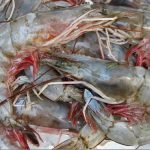 In January, unusually cold weather gripped the southeast region of the USA, with water temperatures plummeting along the coasts of South Carolina and Georgia. During the period, sustained water temperatures affect a variety of marine life, including white shrimp, a valuable commercial fishery in South Carolina and Georgia.
In January, unusually cold weather gripped the southeast region of the USA, with water temperatures plummeting along the coasts of South Carolina and Georgia. During the period, sustained water temperatures affect a variety of marine life, including white shrimp, a valuable commercial fishery in South Carolina and Georgia.
According to the South Carolina Department of Natural Resources (SCDNR), shortly after the first week in January SCDNR staff and members of the public began reporting dead fish and shrimp along the shores of tidal marshes and saltwater impoundments.
As a result, the agency acted to protect surviving white shrimp by closing the trawling season in state waters on January 10, 2018 and requested NOAA Fisheries do the same in adjacent federal waters.
Shortly afterward, the Georgia Department of Natural Resources (GA DNR) closed state waters to trawling on January 15, 2018 and also requested a federal closure. According to GA DNR, observations of recent water temperatures and catches suggest one of the worse freeze kills in the 41 years it has been conducting monitoring surveys, with a 96.1 % reduction in white shrimp abundance from December 2017 to January 2018. White shrimp is the most valuable commercial fishery in Georgia.
The South Atlantic Fishery Management Council SAFMC) manages shrimp in federal waters and has set criteria allowing the closure of adjacent federal waters at the state’s request when cold weather threatens overwintering white shrimp. Federal waters were closed to shrimp trawling off the South Carolina coast on January 10th and off the Georgia coast on January 24th.
“I’ve never seen temperatures drop this fast and this low,” said Mel Bell, Council representative for SCDNR Marine Resources Division. “South Carolina and Georgia needed federal waters closed because whatever white shrimp survived have likely moved offshore to find water temperatures that are suitable.”
source: South Atlantic Fishery Management Council
Leave a Reply
You must be logged in to post a comment.